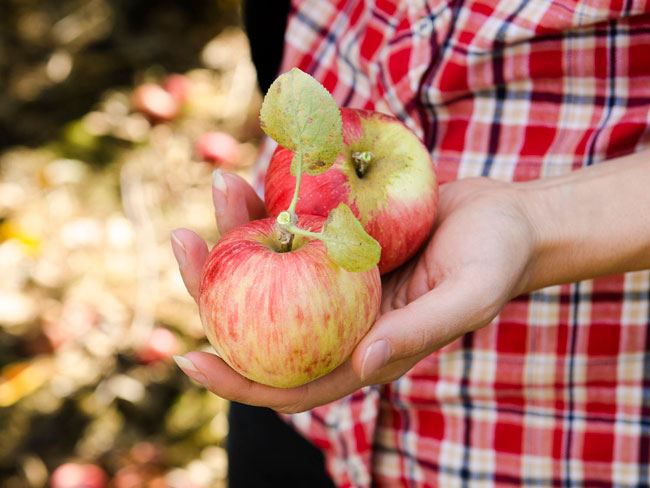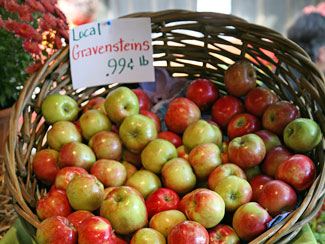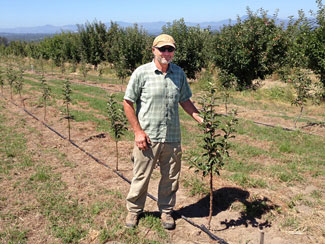 Around the small Northern California town of Sebastopol, you see bumper stickers of all kinds. From the political to the apolitical to cosmic questions such as “What if the hokeypokey is what it’s all about?” But most popular among the tailgate calls to action is “Save the Gravenstein.” Townsfolk here have collaborated over the years to put their region’s heirloom apple back on the foodie map and save it from its endangered status.
Around the small Northern California town of Sebastopol, you see bumper stickers of all kinds. From the political to the apolitical to cosmic questions such as “What if the hokeypokey is what it’s all about?” But most popular among the tailgate calls to action is “Save the Gravenstein.” Townsfolk here have collaborated over the years to put their region’s heirloom apple back on the foodie map and save it from its endangered status.
The “Grav,” as it is affectionately called, has been grown in the area since the turn of the 19th century, and it’s a remarkable apple among apples—it’s both sweet and tart, ideal for fresh eating, and makes a superior pie apple. During World War II it brought agricultural notoriety to Sonoma County when an industry sprang up to process the apple into sauce and dried fruit for a nation at war.
Now, decades later, the apple-processing barns lie in ruins. The influx of housing development and the success of the wine industry are some of the culprits behind the huge reduction in Gravenstein apple orchards over the past 70 years. Wine grapes bring in ten times more income than apples. The lure of growing grapes or subdividing farmland for housing became too economically attractive for many growers of Sonoma’s Gravensteins to resist. Apples grown in the Pacific Northwest and imported from China put further pressure on the county’s apple farmers. The Gravenstein was headed toward obscurity.
 Slow Food Saves the Day
Slow Food Saves the DayBut, as we’ve been counseled many times, never underestimate the power of a small group of committed people to change the world. In 1986 Carlo Petrini founded the organization Slow Food in Italy following a demonstration protesting a McDonald’s going into Rome’s famous Piazza di Spagna, at the foot of the Spanish Steps. The Slow Food movement gave form to the growing global notion that people need to come together to preserve their local food culture. Sebastopudlians who grew up on the Grav and saw it being replaced by tasteless imported apples rallied farmers, producers, restaurants, and the general public to vote with their grocery dollars for the mighty Gravenstein.
All that outreach work resulted in the Gravenstein Apple Presidium, a project of Slow Food USA run by the Slow Food Russian River chapter. Presidia are Slow Food projects that assist artisan producers who maintain agricultural biodiversity.
A merry band of volunteers called the “Apple Core” are the biceps of the Gravenstein Apple Presidium, which has implemented many creative awareness campaigns. Because of the Apple Core’s efforts, public awareness of the Grav is growing. Banners announcing the apple’s arrival span Sebastopol’s Main Street, and excitement surrounds the annual Gravenstein Apple Fair (August 12–13, 2017), a two-day hoedown stuffed with music, food, cider, kids’ activities, a parade, and more.

The craft cider movement has afforded Sonoma County apple growers another way to turn their beautiful heirloom apples into gold—golden cider, that is. Farmer Stan Devoto—a longtime apple farmer and a friend of The FruitGuys—has a daughter, Jolie Devoto-Wade, who has been making a name for herself in the cider world. Jolie and her husband, Hunter Wade, have produced a top-shelf cider for their company, Devoto Orchards Cider, called “Save the Gravenstein”—it’s made from local Gravs.
The emerging cider industry has been a great boost for local apple growers. “Sonoma is the state cider powerhouse, with all the different styles and lots of small producers emerging with new tasting rooms going in. There’s a huge interest in local apples,” Jolie says.
It’s a particularly fertile time for the beverage industry. All kinds of innovative ways to use the local apple bounty are emerging. “This county loves its beverages—beer, wine, kombucha, kefir, shrub…” Jolie says. Cold-pressed juice is becoming all the rage, and the best flavors are from the organic and heirloom varieties that Grav farmers specialize in. The larger national market is taking notice, increasing the chances that the heirloom apple farmers who’ve hung on can survive.
What’s the best way for you to help save the Gravenstein? Eat them! Order The FruitGuys annual Gravenstein box. The FruitGuys gives 16 percent of the profit on every Grav box back to growers so that they can reinvest in the future of these delicious apples.
Want farm-fresh fruit?
We've got you covered.
Heidi Lewis writes about farms, bees, and fruit from her home in Sonoma County, CA. She’s been with The FruitGuys since they were FruitKids.
"*" indicates required fields
Take advantage of faster checkouts and other great benefits.
Create an AccountWe are here to help you provide healthy food, meaning, and a reason to gather in your workplace.
From weekly mixed fruit for break rooms to monthly gifts for remote staff to special projects, we can serve your needs or turn your dreams into a nourishing reality.
Get your weekly dose of the latest fruit info and exclusive updates.
"*" indicates required fields

